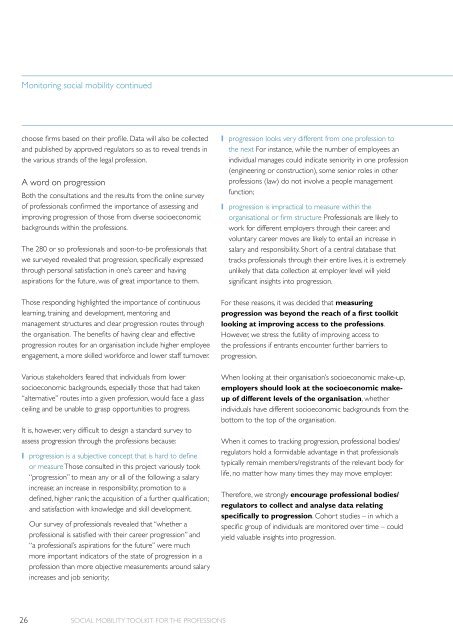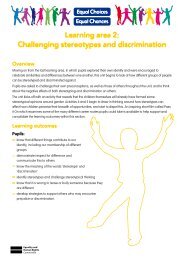Social Mobility Toolkit for the Professions - Equality and Human ...
Social Mobility Toolkit for the Professions - Equality and Human ...
Social Mobility Toolkit for the Professions - Equality and Human ...
Create successful ePaper yourself
Turn your PDF publications into a flip-book with our unique Google optimized e-Paper software.
Monitoring social mobility continued<br />
choose firms based on <strong>the</strong>ir profile. Data will also be collected<br />
<strong>and</strong> published by approved regulators so as to reveal trends in<br />
<strong>the</strong> various str<strong>and</strong>s of <strong>the</strong> legal profession.<br />
a word on progression<br />
both <strong>the</strong> consultations <strong>and</strong> <strong>the</strong> results from <strong>the</strong> online survey<br />
of professionals confirmed <strong>the</strong> importance of assessing <strong>and</strong><br />
improving progression of those from diverse socioeconomic<br />
backgrounds within <strong>the</strong> professions.<br />
<strong>the</strong> 280 or so professionals <strong>and</strong> soon-to-be professionals that<br />
we surveyed revealed that progression, specifically expressed<br />
through personal satisfaction in one’s career <strong>and</strong> having<br />
aspirations <strong>for</strong> <strong>the</strong> future, was of great importance to <strong>the</strong>m.<br />
those responding highlighted <strong>the</strong> importance of continuous<br />
learning, training <strong>and</strong> development, mentoring <strong>and</strong><br />
management structures <strong>and</strong> clear progression routes through<br />
<strong>the</strong> organisation. <strong>the</strong> benefits of having clear <strong>and</strong> effective<br />
progression routes <strong>for</strong> an organisation include higher employee<br />
engagement, a more skilled work<strong>for</strong>ce <strong>and</strong> lower staff turnover.<br />
Various stakeholders feared that individuals from lower<br />
socioeconomic backgrounds, especially those that had taken<br />
“alternative” routes into a given profession, would face a glass<br />
ceiling <strong>and</strong> be unable to grasp opportunities to progress.<br />
it is, however, very difficult to design a st<strong>and</strong>ard survey to<br />
assess progression through <strong>the</strong> professions because:<br />
� progression is a subjective concept that is hard to define<br />
or measure those consulted in this project variously took<br />
“progression” to mean any or all of <strong>the</strong> following: a salary<br />
increase; an increase in responsibility; promotion to a<br />
defined, higher rank; <strong>the</strong> acquisition of a fur<strong>the</strong>r qualification;<br />
<strong>and</strong> satisfaction with knowledge <strong>and</strong> skill development.<br />
our survey of professionals revealed that “whe<strong>the</strong>r a<br />
professional is satisfied with <strong>the</strong>ir career progression” <strong>and</strong><br />
“a professional’s aspirations <strong>for</strong> <strong>the</strong> future” were much<br />
more important indicators of <strong>the</strong> state of progression in a<br />
profession than more objective measurements around salary<br />
increases <strong>and</strong> job seniority;<br />
26 <strong>Social</strong> <strong>Mobility</strong> toolkit For <strong>the</strong> proFeSSionS<br />
� progression looks very different from one profession to<br />
<strong>the</strong> next For instance, while <strong>the</strong> number of employees an<br />
individual manages could indicate seniority in one profession<br />
(engineering or construction), some senior roles in o<strong>the</strong>r<br />
professions (law) do not involve a people management<br />
function;<br />
� progression is impractical to measure within <strong>the</strong><br />
organisational or firm structure professionals are likely to<br />
work <strong>for</strong> different employers through <strong>the</strong>ir career, <strong>and</strong><br />
voluntary career moves are likely to entail an increase in<br />
salary <strong>and</strong> responsibility. Short of a central database that<br />
tracks professionals through <strong>the</strong>ir entire lives, it is extremely<br />
unlikely that data collection at employer level will yield<br />
significant insights into progression.<br />
For <strong>the</strong>se reasons, it was decided that measuring<br />
progression was beyond <strong>the</strong> reach of a first toolkit<br />
looking at improving access to <strong>the</strong> professions.<br />
however, we stress <strong>the</strong> futility of improving access to<br />
<strong>the</strong> professions if entrants encounter fur<strong>the</strong>r barriers to<br />
progression.<br />
When looking at <strong>the</strong>ir organisation’s socioeconomic make-up,<br />
employers should look at <strong>the</strong> socioeconomic makeup<br />
of different levels of <strong>the</strong> organisation, whe<strong>the</strong>r<br />
individuals have different socioeconomic backgrounds from <strong>the</strong><br />
bottom to <strong>the</strong> top of <strong>the</strong> organisation.<br />
When it comes to tracking progression, professional bodies/<br />
regulators hold a <strong>for</strong>midable advantage in that professionals<br />
typically remain members/registrants of <strong>the</strong> relevant body <strong>for</strong><br />
life, no matter how many times <strong>the</strong>y may move employer.<br />
<strong>the</strong>re<strong>for</strong>e, we strongly encourage professional bodies/<br />
regulators to collect <strong>and</strong> analyse data relating<br />
specifically to progression. cohort studies – in which a<br />
specific group of individuals are monitored over time – could<br />
yield valuable insights into progression.












